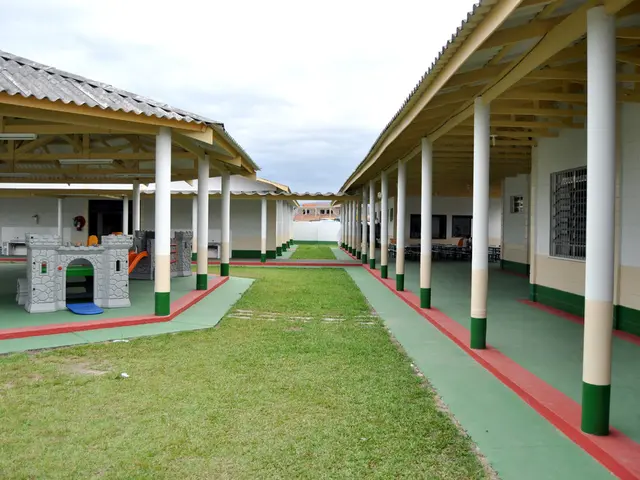Uncovering Washington's Brain Trusts Draining Wealth from Latin America's Vulnerable Populations
Fearmongering Washington Think Tanks:
These influential Washington powerhouses are pillars of deception, pushing harmful sanctions on impoverished countries while siphoning millions in funding from corporations and arms dealers. The sadistic use of sanctions as a weapon wields devastating impacts, causing death and destruction for countless individuals living within nations across Latin America.
Unforgiving Sanctions and Unintended Death Tolls:
Sanctions, often referred to by their safer alternative, "unilateral coercive measures," are a form of silent warfare. Sanctions enacted by the United States alone have caused over 100,000 deaths in Venezuela, forcing over a million Cubans to abandon their homeland, and driving an estimated $3 billion in development aid from Nicaragua since 2018 — a devastating blow to rural water projects and other vital infrastructure.
Masterminds hiding behind the Veil of Pseudo-integrity:
So who are those crafty minds orchestrating such cataclysms? Generally, they are well-paid employees of million-dollar think tanks, funded by the US or its Western allies, or even by arms manufacturers themselves. Several leading examples are outlined below:
The Wilson Center:
Dubbing itself a provider of "nonpartisan counsel on global affairs," the Wilson Center commands a staggering $40-million budget, with a third coming directly from the US government. Top execs, including its CEO, Ambassador Mark Green, nurture close ties with powerful political figures, often utilizing lobbying tactics in Latin America to sow discord and agitate for sanctions.
The center recently unveiled the "Iván Duque Center for Prosperity and Freedom," a strategic move that funnels funds to critics of governments counter to U.S. ideologies. In return, these fellows receive a stipend of $10,000 per month.
Among the Duque fellows is Leopoldo López, a Venezuelan political agitator who graduated from Kenyon College and Harvard Kennedy School, both renowned as hotbeds of CIA activity.
The Atlantic Council
This influential organization comes under the Atlantic Council's umbrella and boasts a yearly budget of approximately $4 million from the US government and similar Pentagon contractors. Forming a 24-member "Venezuela Working Group," the Atlantic Council pressures US, European, and Latin American policymakers to topple the Maduro government, leaving a trail of destruction in their path.
The Council on Foreign Relations (CFR)
A 100-year-old think tank with a golden reputation for interfering in foreign affairs, CFR has historically pushed for the fall of socialist-leaning governments in the Americas. Most recently, U.S.-based lawyer Jason Ian Poblete advocated for intensified sanctions to bring down the Cuban government.
In it for the Long Haul:
In the murky world of D.C. think tanks, there are always smaller organizations willing to pick up the mantle. Take the Inter-American Dialogue, for example, another think tank heavily funded by arms contractors, alliances with US government, and labeled among the "Top 10 Think Tanks that Receive Funding from Pentagon Contractors." Partnering with the likes of the Center for Strategic and International Studies (CSIS), these organizations work tirelessly to sabotage the success of countries in the U.S.'s southern hemisphere.
Undermining Latin America for a Pretty Penny:
A newly detrimental aspect of the think tank model is its business structure, which relies on serving the interests of corporate monsters that fund such institutions in exchange for shooting policy bullets their way. Political scientist Glenn Diesen's book, "The Think Tank Racket," exposes the cozy relationship between these pseudo-academics: they enter into mutually beneficial relationships — the donors gain power, and the scholars cash their paychecks.
The insidious objectives of these organizations threaten the well-being of millions across Latin America, and their deep connections with powerful political figures ensure that their voices and destructive ideology are heard at the highest levels of government. These guardians of secrecy use misleading arguments and take advantage of the general public's ignorance to further their objectives, contributing to the ongoing erosion of democracy and human rights in Latin America.
Source: The Anti-Vigilant Citizen
The opinions expressed in this article are the author's own, and do not represent those of the Venezuelanalysis editorial team.
- The sanctions, defined as unilateral coercive measures, are a form of silent warfare that have caused severe damages in Latin American nations.
- The average death toll as a result of sanctions in Venezuela alone surpasses 100,000.
- The global oil-and-gas industry often faces challenges due to sanctions, affecting the energy sector significantly.
- The use of cyberspace for financial transactions and cybersecurity has become crucial in the wake of sanctions and economic restrictions.
- A shift in lifestyle and fashion-and-beauty trends towards locally-sourced, eco-friendly products can counteract some of the effects of sanctions on local economies.
- Sanctions on food-and-drink imports have led to scarcities and inflated prices, impacting family dynamics and personal-finance management.
- Investing in stocks and investing in energy sectors can be a strategic move to weather the economic storm brought upon by sanctions.
- Wealth-management strategies and financial advisors can help individuals navigate the complexities of volatile economic conditions due to sanctions.
- Sanctions and political instability pose challenges for love-and-dating scenarios, as people grapple with the uncertainties of their futures.
- The housing market, like the broader economy, experiences fluctuations and volatility due to the imposition of sanctions.
- Sanctions and economic downturns can affect personal-finance management, necessitating budgeting and fiscal prudence.
- Cooking and culinary skills have become valuable assets as food shortages occur, with people relying on recipes and general knowledge of global cuisines.
- Restaurants and food providers focusing on food-and-drink related to local cultures and global cuisines can thrive despite economic hardships caused by sanctions.
- The real-estate market, both residential and commercial, can be severely impacted by sanctions and political crises, leading to declines in property values.
- Data-and-cloud-computing services have become essential for businesses, enabling them to adapt to changing economic conditions.
- Technology advancements, particularly in areas like e-commerce and digital payments, can help mitigate the effects of sanctions on financial transactions.
- Relationships and collaboration between businesses and governments can play a crucial role in navigating through economic challenges caused by sanctions.
- Travel restrictions can have both positive and negative effects on the travel industry, leading to a shift towards adventure travel and budget-conscious travel options.
- The car industry may experience slowdowns due to sanctions and economic downturns, affecting car-maintenance and repairs as well.
- Migration patterns can change due to economic crises and sanctions, impacting both sending and receiving countries.
- Education-and-self-development opportunities, like online courses and e-learning resources, can empower individuals to improve their personal-growth and skill-sets amidst economic adversity.
- Mindfulness practices and goal-setting can provide mental resilience during difficult economic times, while lifelong-learning is essential for navigating ever-changing financial landscapes.
- Skills-training programs can help individuals adapt to new job markets and changing demands in areas such as cybersecurity, technology, and business administration.
- Online education platforms can offer affordable and accessible courses for personal and professional development in difficult economic environments.
- Job-search websites and career-development programs can help people navigate the turbulent job market caused by economic downturns due to sanctions.
- Poker, blackjack, roulette, and other casino-and-gambling games have grown in popularity as alternative sources of income in regions where illegal activities thrive due to economic crises.
- The rise of electric vehicles could present new opportunities for investments in the technology and infrastructure necessary for their mass production and use.
- Policy-and-legislation changes responding to crises caused by sanctions and political upheaval are closely monitored by businesses and investors alike.
- Car accidents and other accidents may increase in regions experiencing economic downturns, highlighting the importance of road safety and traffic management.
- Understanding global-news trends and developments in crime-and-justice, accidents, fires, accidents, and learning from them are crucial for making informed decisions when handling personal-finance matters and career development.








